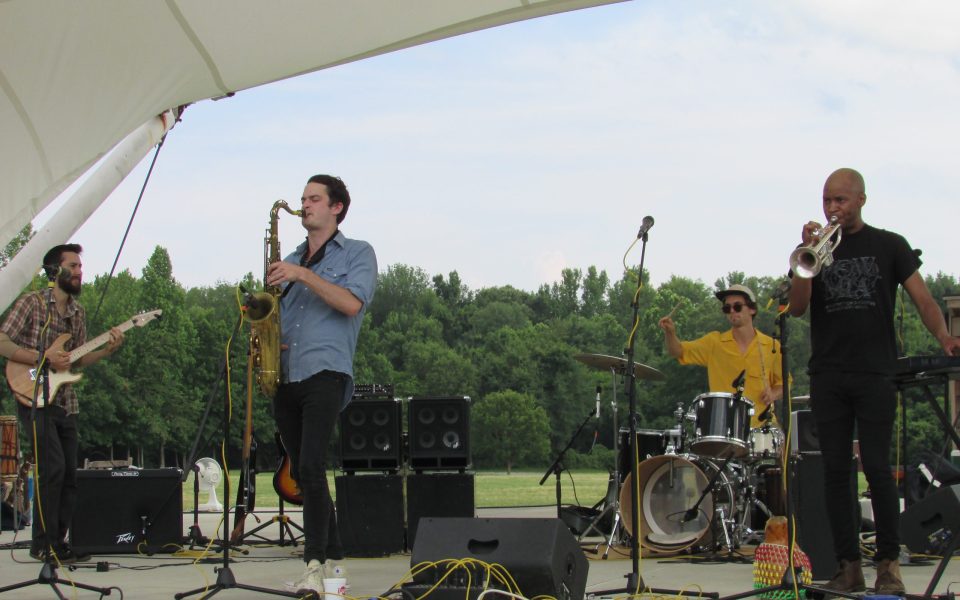Humidity clung to the air as the heat began to ease in the early evening and Super Yamba Band took the stage at the outdoor amphitheater at Barber Park in Greensboro for the Levitt Amp Music Series on June 30.
A smattering of fat raindrops had intimated at the threat of a downpour on the west side of the city, but it looked like there might yet be a reprieve. The lawn swooped up from the stage between two radiating rows of pine trees and listeners reclined on lawn chairs, juggled batons or meandered over to Preyer Brewing’s beer tap.
Super Yamba Band’s taut, circular groove — a fat wedge of Afro-funk with pulsing bass, serpentine melody radiating from an electric guitar, groovy, futuristic keyboards, syncopated percussion and blaring horns — was energizing yet still relaxing enough that few audience members felt obliged to dance. But midway through the band’s first number, the groove roused a four-foot black garter snake, apparently theretofore unnoticed, that had been lying coiled on the ground in front of the stage, deceptively similar to the black cord running from the stage to the sound booth. When the snake began to move a couple people jumped back, causing a chain reaction in the crowd, and those in the front warily watched the creature make halting progress to the side. Eventually, two Greensboro police officers calmly approached, and one prodded the snake with his boot, prompting the snake to take refuge in the grove of pines.
Super Yamba Band, better known as the Brand New Life, is one of Greensboro’s more unique exports. Formed in 2009, the Brand New Life quickly established a heavy funk sound indebted to the late Nigerian Afrobeat pioneer Fela Kuti that also explored ventured into jazz and rock territory. With saxophonist Walter Fancourt, drummer Daniel Yount, percussionist Evan Frierson and bassist Seth Barden of Greensboro forming the nucleus, along with trumpeter Sean Smith of Charlotte, the band decamped for Brooklyn in 2013. They met guitarist Eric Burns in New York.
The band has had the opportunity to share the stage with Antibalas, perhaps the most prominent Afrobeat exponent on the East Coast, along with Seun Kuti, who leads his late father Fela’s band Egypt 80.
The group has recently started performing its more African-inspired music under the name the Super Yamba Band, with plans to explore indie rock, psychedelic and pop music under the moniker of Future Heart. Yount said the two formats of the same group of musicians is more of a natural progression than the outgrowth of any deliberate plan.
Super Yamba Band’s African music palette continues to expand beyond the Afrobeat template established by Fela Kuti in the early ’70s through various collaborations. They met Mamadou Mbengue, a Senegalese griot in North Carolina, which prompted an exploration of mbalax, the pop music of Mbengue’s native country that is especially evident in Frierson’s talking-drum style. Members of Super Yamba Band also perform with Mamadou’s Fantastic Band.
More recently, Super Yamba Band has collaborated with Ismael Kouyaté, a Guinean griot, dancer, choreographer and singer, releasing a song called “N’diarabi” that features Kouyaté on vocals in late May.
During Super Yamba Band’s performance at Barber Park on June 30, they invited Diali Cissokho, whose band Kaira Ba headlined the concert, to join them onstage. Cissokho, a Senegalese griot and kora player who now makes his home in the Triangle area, contributed rousing vocals to the number in Kouyaté’s stead, although he seemed somewhat hampered by an inability to hear himself in the monitors. Will Ridenour of Kaira Ba added a muscular heft with his djembe playing, alongside Frierson on talking drum.
With a talking drum opening and reverb-laden keyboards that become progressively more haunting and echo-y courtesy of Smith, “N’diarabi” brought to mind a shimmering psychedelic haze of a Lagos, Nigeria nightclub circa 1971.
As a measure of the band’s dexterity, Super Yamba Band’s set moved seamlessly from a revival of some older material from the Brand New Life that gave Fancourt the opportunity to blow a free jazz, sheets of sound-style solo on saxophone, while the restrained reggae groove and relaxed tempo of another song featuring Smith on trumpet evoked the Cuban-born ska trombonist Rico Rodriguez.
Near the end of Super Yamba Band’s set, members of Kaira Ba again joined them onstage for a cover of “Mi Ve Wa Se,” a song by the legendary Orchestre Poly Rythmo de Cotonou from Benin. The heady brew summoned by the musicians spiked by Fancourt’s exhilarating and fierce saxophone solo provided a tell for Super Yamba Band’s MO — not inflexible adherence to tradition, but an orientation towards West Africa as a focal point, ever absorbing and adapting new influences.
Join the First Amendment Society, a membership that goes directly to funding TCB‘s newsroom.
We believe that reporting can save the world.
The TCB First Amendment Society recognizes the vital role of a free, unfettered press with a bundling of local experiences designed to build community, and unique engagements with our newsroom that will help you understand, and shape, local journalism’s critical role in uplifting the people in our cities.
All revenue goes directly into the newsroom as reporters’ salaries and freelance commissions.


Leave a Reply